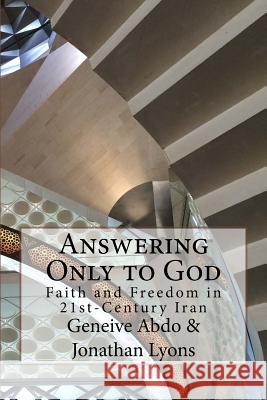Answering Only to God: Faith and Freedom in 21st-Century Iran » książka
Answering Only to God: Faith and Freedom in 21st-Century Iran
ISBN-13: 9781518604645 / Angielski / Miękka / 2015 / 478 str.
Of the many 20th-century upheavals that continue to rattle our 21st-century world, few are as misunderstood or as stubbornly resistant to Western understanding as Iran's Islamic Revolution. Now, that Iran and its long-time foe, the United States, appear to be mending ties, there is widespread hope that the distortions, misunderstandings, and stereotypes that formed the Western impression of the Islamic republic will end. For more than three decades, viewing Iranian society as an incendiary, pariah state that harbors unrelenting hostility for many of its influential, pro-American neighbors - from Israel to Saudi Arabia - has helped keep the focus on Iran as the implacable foe of U.S. interests. While the degree of demonization will likely subside as Iran and the West improve relations, this is unlikely to bring Westerners to a closer understanding of why the Islamic revolution happened in the first place. The more difficult challenge is to develop a proper appreciation of the far more fundamental role played by the vexed questions of religion and religious identity - topics that readers, analysts, politicians, and academics all too often discount in favor of more familiar and comfortable factors: the political, the economic, and the strategic. This is not only true for Iran but for Arab societies as well, which are often studied and analyzed with little attention paid to the role religion in destabilizing societies and fomenting violence. The Western understanding of history, grounded in the Enlightenment with its general disdain for religion, has compounded the difficulty of analyzing and understanding those societies - in contrast to our own - in which religion has never been formally separated from other central aspects of social, political, and intellectual life. Answering Only to God is an attempt to redress this state of affairs by focusing much-needed attention on the very questions that continue to this day to animate Iran and, by extension, much of the contemporary Arab and broader Muslim world: What does it mean to be a good Muslim? And who gets to answer that question? In the specific case of Iran, these concerns have taken on another, related aspect, chiefly, Can the Iranian Revolution deliver on its promise to create a society that is both recognizably democratic and legitimately Islamic?
Zawartość książki może nie spełniać oczekiwań – reklamacje nie obejmują treści, która mogła nie być redakcyjnie ani merytorycznie opracowana.











